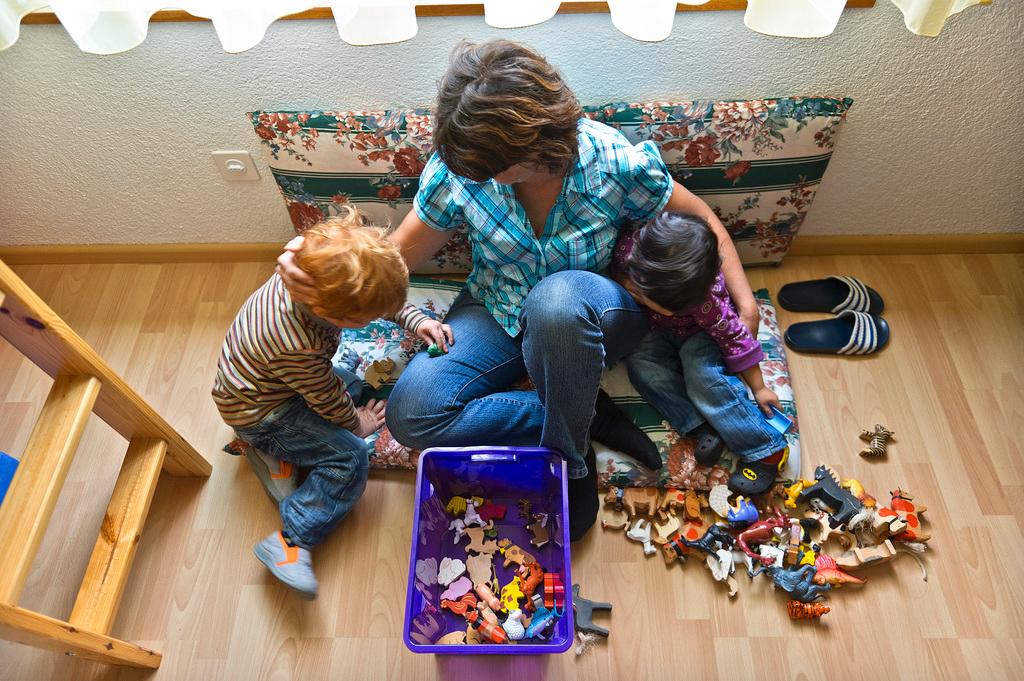Switzerland: home to the world’s most expensive crèches

In Switzerland, full-time childcare costs parents some two-thirds of an average salary – a world record. While some financial aid and tax breaks do exist, the lack of state financing has serious repercussions for the labour force.
In 2014, Switzerland maintained its position as the number one destination for white-collar expatriate workers, but a study by HSBC bank exposed some major concerns raised by new arrivals. Heading the list was the exorbitant cost of childcare.
International studies support the view: Switzerland easily tops the list of Organisation for Economic Co-operation and Development (OECD) countries in terms of childcare costs.
That said, all countries, including Switzerland, offer either direct financial aid or tax breaks for families to assist with the costs of childcare. When the different forms of assistance are deducted from the total cost of a place in a crèche, the end cost to parents is “just” 30% of the average Swiss income.

Local authorities do subsidise a limited number of places in childcare centres, with preference given to single-parent families or those with lower incomes. Almost 90% of childcare centres in the country are private and financed by parents.
In total, just 0.1% of Switzerland’s gross domestic product (GDP) is designated for financing childcare, less than in most European countries. By comparison, 0.8% of GDP is allocated to the military.
Structures for childcare facilities are largely determined by the cantons and communes. The financing, cost and number of places available can vary considerably depending on the region.
Thanks to federal aid, more than 23,000 childcare places were created in the ten years from 2003 to 2013. However, the fact remains that three-quarters of communes do not finance any childcare places and three-quarters of children under the age of three still do not have access to a crèche.
French-speaking Switzerland and German-speaking cities – such as Zurich, Zug and Basel – provide the most places. In rural and eastern areas, a conservative view of the family dominates: generally speaking, the years preceding a child’s entry into preschool are considered a family matter in which the state has no business meddling.
In a European comparison, Switzerland has one of the lowest proportions of children under the age of three who attend crèche for a majority of their time.
This has a direct impact on the structure of the labour force. Families with one or two small children and in which both parents work full time are rare. This means the proportion of very young children placed in childcare is low, as is the proportion of couples who both work full time.
According to a study carried out by the Migros retail group, the high cost and lack of childcare places often forces parents to seek alternative childcare arrangements. Almost 80% of grandparents are more or less regularly charged with looking after their grandchildren. Arrangements between neighbours and with nannies are also common.
In a large majority of cases, it is women who reduce their working hours after a child is born: just 10% of working men in Switzerland work part-time, compared with 46% of women.
This situation has negative effects on the careers of women and contributes to the growth of salary inequality between the sexes, which is around 20% in Switzerland. The creation of more childcare places at affordable prices is one measure that is regularly proposed by unions and the political left as a means of reducing the salary gap.
A better integration of women into the workforce would also reduce the need to look abroad for the workers required to fuel economic growth. As such, it is one of the measures proposed by the Swiss government as it prepares to enact the initiative “against mass immigration” as narrowly approved by Swiss voters a year ago. The debate is far from over and promises some fierce political wrangling.
Crèche data
On February 26, 2015, the Federal Social Insurance OfficeExternal link reported that the number of crèches had doubled since 2003 as a result of federal subsidies: some 47,760 new daycare places had been created.
Although most of the crèches are not occupied at 100%, around half say that cannot cope with all the demands, due to problems of coordination: in particular there is a lack of places for babies and a lack of places available on the days wanted.
35% of children attend daycare two days a week, 20% one or three days, 10% four days and 12%.
(Translated from French by Sophie Douez)

In compliance with the JTI standards
More: SWI swissinfo.ch certified by the Journalism Trust Initiative














You can find an overview of ongoing debates with our journalists here . Please join us!
If you want to start a conversation about a topic raised in this article or want to report factual errors, email us at english@swissinfo.ch.